

Gebeleizis. Gebeleizis (or Gebeleixis, Nebeleizis) was a god worshiped by the Getae, probably related to the Thracian god of storm and lightning, Zibelthiurdos.[1] He was represented as a handsome man, sometimes wearing a beard.
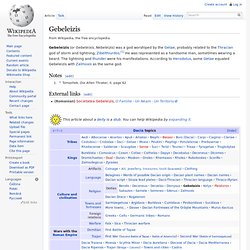
The lightning and thunder were his manifestations. According to Herodotus, some Getae equated Gebeleizis with Zalmoxis as the same god. Notes[edit] Jump up ^ Tomashek, Die Alten Thraker, II, page 62 External links[edit] (Romanian) Societatea Gebeleizis, O Familie - Un Neam - Un Teritoriu. Horagalles. Sami people worshipping Horagalles or Tiermes.
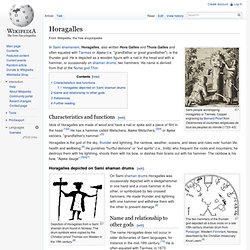
Copper engraving by Bernard Picart from Cérémonies et coutumes religieuses de tous les peuples du monde (1723–43) In Sami shamanism, Horagalles, also written Hora Galles and Thora Galles and often equated with Tiermes or Aijeke (i.e. Indra. Origins[edit] Aspects of Indra as a deity are cognate to other Indo-European gods; they are either thunder gods such as Thor, Perun, and Zeus, or gods of intoxicating drinks such as Dionysus.
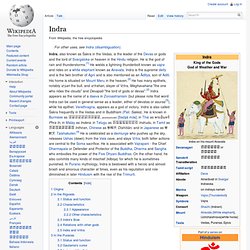
The name of Indra (Indara) is also mentioned among the gods of the Mitanni, a Hurrian-speaking people who ruled northern Syria from ca.1500BC-1300BC.[5] Vedic Indra corresponds to Verethragna of the Zoroastrian Avesta as the noun verethragna- corresponds to Vedic vrtrahan-, which is predominantly an epithet of Indra. Jupiter (mythology) The consuls swore their oath of office in Jupiter's name, and honoured him on the annual feriae of the Capitol in September.
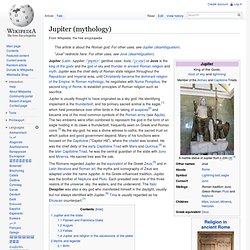
To thank him for his help (and to secure his continued support), they offered him a white ox (bos mas) with gilded horns.[10] A similar offering was made by triumphal generals, who surrendered the tokens of their victory at the feet of Jupiter's statue in the Capitol. Some scholars have viewed the triumphator as embodying (or impersonating) Jupiter in the triumphal procession.[11] During the Conflict of the Orders, Rome's plebeians demanded the right to hold political and religious office. During their first secessio (similar to a general strike), they withdrew from the city and threatened to found their own.
Perkele. Pronunciation.
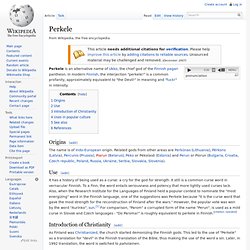
Perëndi. Perëndi is an old Illyrian word for God and the sky, especially invoked in incantations and songs praying for rain.[1] He was also an Illyrian god of thunder or storm-god.
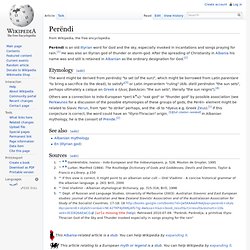
After the spreading of Christianity in Albania his name was and still is retained in Albanian as the ordinary designation for God.[2] Etymology[edit] The word might be derived from perëndoj "to set (of the sun)", which might be borrowed from Latin parentare "to bring a sacrifice (to the dead), to satisfy"[3] or Latin imperantem "ruling" (Alb. dielli perëndon "the sun sets", perhaps ultimately a calque on Greek ο ήλιος βασιλεύει "the sun sets", literally "the sun reigns").[4]
Perkūnas. Etymology[edit] The name continues PIE *Perkwunos, cognate to *perkwus, a word for "oak", "fir" or "wooded mountain".
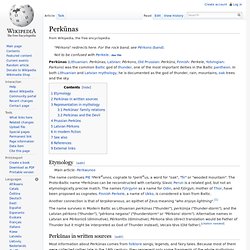
The Proto-Baltic name *Perkūnas can be reconstructed with certainty. Slavic Perun is a related god, but not an etymologically precise match. Perun. Perun is described as a rugged man with a copper beard.
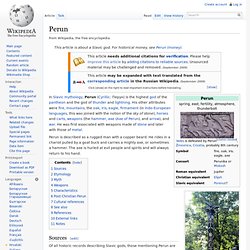
He rides in a chariot pulled by a goat buck and carries a mighty axe, or sometimes a hammer. The axe is hurled at evil people and spirits and will always return to his hand. Taranis. Gundestrup cauldron, created between 200 BC and 300 AD, is thought to have a depiction of Taranis on the inner wall of cauldron on tile C.
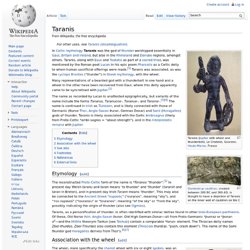
Teshub. For the Japanese professional wrestler known as TARU, see Yoshikazu Taru.
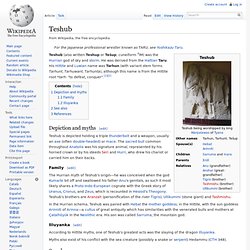
Teshub (also written Teshup or Tešup; cuneiform dIM) was the Hurrian god of sky and storm. He was derived from the Hattian Taru. His Hittite and Luwian name was Tarhun (with variant stem forms Tarhunt, Tarhuwant, Tarhunta), although this name is from the Hittite root *tarh- "to defeat, conquer".[1][2] Thor. In Norse mythology, Thor (/θɔr/; from Old Norse Þórr) is a hammer-wielding god associated with thunder, lightning, storms, oak trees, strength, the protection of mankind, and also hallowing, healing and fertility. The cognate deity in wider Germanic mythology and paganism was known in Old English as Þunor and in Old High German as Donar (runic þonar ᚦᛟᚾᚨᚱ), stemming from a Common Germanic *Þunraz (meaning "thunder").
Ukko. Pre-Christian pendants associated with gods of thunder. A) "Finnish type", B) "Swedish type", C) "Wolf's cross". Ukko,[1] or Äijä or Äijö (Finnish: male grandparent, old man),[2] parallel in Estonian mythology to Uku,[3] is the god of the sky, weather, harvest and thunder[4] in Finnish mythology.
Zeus. Name The Chariot of Zeus, from an 1879 Stories from the Greek Tragedians by Alfred Church. The god's name in the nominative is Ζεύς Zeús /zdeús/. It is inflected as follows: vocative: Ζεῦ / Zeû; accusative: Δία / Día; genitive: Διός / Diós; dative: Διί / Dií.